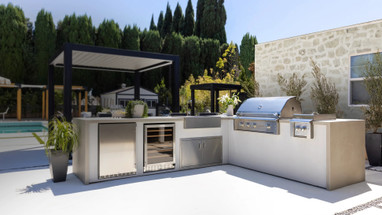27th Mar 2024
Essential Tips for Choosing Your Next Gas Grill
Selecting Your Grill
Integrated Outdoor Cooking Stations
Integrated Gas Grills offer a seamless fit within custom outdoor kitchen islands. They match with a selection of complimentary outdoor appliances for a unified look. Integrating these grills into your backyard enhances not just the aesthetics but also the value of your property.
Portable Outdoor Grills
Portable outdoor grills stand on a cart for easy flexibility in your backyard space. Carts typically feature storage for the gas tank and other grilling essentials. These grills are ideal for those who like to adjust their cooking area or host different events. Look for models with an additional side burner to expand your cooking capabilities.
Choosing the Right Fuel for Your Grill
Grills Powered by Natural Gas
For those who have a natural gas line already installed at their residence, choosing a grill that operates on this type of fuel could prove to be the most straightforward option. Similar to other household utilities, natural gas is supplied by a service provider and billed regularly. The convenience factor is significant as it ensures an uninterrupted supply, allowing for frequent use without the worry of depleting fuel reserves. Typically, grills utilizing natural gas are stationary due to the requirement for a fixed line.
- Availability: Requires existing natural gas line.
- Convenience: Continuous supply; no need to replace tanks.
- Mobility: Generally limited to where the gas line can reach.
Grills Utilizing Propane Gas
Individuals lacking access to natural gas lines might find propane-powered grills more suitable. Propane is often provided in 20-pound tanks that are widely available for purchase or exchange at numerous retail locations, including hardware and grocery stores. Refilling these tanks is a simple process of visiting a nearby propane supplier. While propane requires active management of fuel levels, it offers the advantage of portability, as the tanks allow for the relocation of the grill as desired.
- Convenience: Exchange or refill tanks as needed.
- Mobility: Enhanced by the ability to move the tank with the grill.
Selecting the Appropriate Grill Dimension
When searching for a gas grill, the cooking surface size should be a top consideration. An adequate surface allows the preparation of greater quantities of food, and the number of burners—ranging from 1 to 8 on various models—can determine the cooking methods at your disposal. A greater burner count provides versatility in creating multiple cooking zones for different techniques.
Before deciding, consider the usual number of people you cook for, the maximum you might entertain, and the frequency of such gatherings. Your needs will be best met by matching your usage to one of four general grill size categories: Compact, Intermediate, Full-Size, or Extra-Large. It's easy to deactivate unneeded burners; however, the surface area can't be expanded.
- Compact Grills: Width: Up to 26 inches Burners: 1 to 3 Ideal for: Small families or groups Cooking techniques: Limited multi-zone cooking
Compact grills suit small, day-to-day family meals or grilling for a group of a dozen.
- Intermediate Grills: Width: 27 to 33 inches Burners: 2 to 4 Features: Indirect heat, side and rotisserie burners for further cooking options Suited for: Enhanced cooking methods beyond the basics
This category balances between sufficient grilling space and additional features for culinary flexibility.
- Full-Size Grills: Width: 34 to 42 inches Burners: 3 to 6 Techniques: Multi-zone temperature control, indirect roasting, parallel cooking for courses Perfect for: Large families and social gatherings
Grills in this class enable the exploration of advanced grilling techniques and can manage several dishes simultaneously.
- Extra-Large Grills: Width: 43 inches and more Burners: Up to 8 Specialties: Equipped for rotisserie, searing, ample storage, and feeding crowds Use case: Frequent hosts for large events or parties
The largest grills cater to demands of sizeable groups and varied cooking styles.
Utility Note: A grill's capacity is subjective, dependent on meal choices and cooking preferences. Industry specialists sometimes use a burger metric to estimate a grill’s capacity to visualize potential serving sizes for parties or large family gatherings. When choosing a grill size, balancing practical space requirements with the potential for entertaining is crucial for getting the most out of your grilling experience.
Selecting the Right Grill Category
Opulent Grilling Machines
- Crafted with superior-grade components and materials, commonly accompanied by comprehensive lifetime guarantees.
- Elegantly styled, elevating outdoor aesthetics while serving as an elegant focal point.
- Equipped with the latest features to enhance the culinary experience and entertain guests.
- Boasts the most advanced cooking systems and broadest range of temperatures.
High-End Barbecue Grills
- Constructed from heavy-duty 304 stainless steel for long-lasting use, with some featuring lifetime warranties.
- A variety of available add-ons provide a personalized grilling experience.
- Delivers even, steady cooking heat and is designed for ease of temperature management.
Value-Focused Cookout Companions
- Combination of stainless and painted steel in construction, including guarantees lasting up to a decade.
- Balances affordability with sufficient quality and functionality.
- Offers satisfactory heat maintenance with maximum temperatures around 500° Fahrenheit, however, may have fewer features and size options.
Basic Outdoor Grills
- The most budget-friendly choice, perfect for newcomers to grilling.
- Simple designs and essential features suited for those beginning their grilling adventures without significant initial costs.
- Some models are constructed with durability in mind, backed by lifetime warranties.
Each grill category presents a distinct blend of quality, functionality, and investment, ensuring options tailored to varied grilling preferences and budgets. It is essential to consider the warranty as a pivotal aspect of your decision-making since it reflects the manufacturer's confidence in their product and commitment to customer service, offering peace of mind for the future.
Consider Your Cooking Preferences
Reflect on your personal grilling habits to pinpoint which grill features align best with your culinary style. Whether you fancy searing steaks to perfection, slowly roasting vegetables, or experimenting with pizza on the grill, each grilling approach influences the type of grill and customization options you might value.
For those who prioritize consistency and ease of use, astraightforward gas grillwith dependable performance is ideal. Models such as theVictory gas grillor theBlaze Prelude LBM seriesoffer simplicity without sacrificing quality, ensuring a satisfactory cooking experience with each use.
Tailoring your gas grill to your liking is also a possibility. The market is replete with accessories that can broaden your cooking repertoire, fromadditional grill rackstospecialized pizza tools. Monitoring tools likeWi-Fi or Bluetooth-enabled thermometerscan enhance your control over the cooking process, ensuring your dishes are grilled to just the right temperature. Don’t forget to protect your investment with adurable grill coverto shield against the elements, thereby prolonging the life of your grill.
Final Considerations
When deciding on where to place your gas grill, consider its features and the requirements they may present. Grills equipped with add-ons like rotisseries or lighting will necessitate proximity to an electrical source for operation. For those opting for a built-in model, it's essential to acknowledge that particular configurations, especially when integrating into combustible materials, require an insulated jacket—a safety measure not to be overlooked.
Ventilation Needs for Fuel Types:
- Natural Gas:Less dense than air, necessitates specific ventilation considerations.
- Propane:Denser than air, requires different ventilation to ensure safety.
It's paramount to seek expert advice when planning your outdoor kitchen setup. Assistance is often available, such as through a complimentary Outdoor Living Design Service, to help align your vision with safety protocols.
Understanding BTUs:
- The Misconception:BTUs are often mistakenly equated with heat output.
- The Reality:BTUs measure the energy needed to raise the temperature of water, which relates to the efficiency of boiling water, not grill performance.
- Better Indicators:Max temperature and temperature range provide a more accurate representation of grill capabilities.
A well-designed, fuel-efficient grill achieves high temperatures with lower BTUs, signifying less gas consumption for the same level of heat output—a benefit for both the environment and your budget.
Experts in barbecue grilling are available to provide guidance and answer any queries regarding gas grills and outdoor living spaces. Selecting the ideal gas grill need not be daunting with the correct information and resources at hand.
Key Questions for Gas Grill Shoppers
Considerations for Gas Grill Features
Key features to factor in when selecting a gas grill encompass:
- BTU Rating (British Thermal Units):This measures the heat output, and while more BTUs can mean more power, it is not the sole indicator of efficiency.
- Grill Size and Cooking Area:Match the grill size to your space and the number of people you typically cook for.
- Build Quality:Opt for stainless steel or coated cast-iron grates for longevity and easier maintenance.
- Heat Distribution:Look for a design that ensures even cooking without hot spots.
Selecting the Right Gas Grill Within Your Budget
Steps to choose a gas grill that aligns with your financial plan and culinary requirements:
- Establish a budget range.
- Prioritize must-have features over nice-to-haves.
- Consider the cost of additional accessories.
- Research and compare models within your price range.
Advantages of Propane Grills Over Other Grill Varieties
Propane grills offer distinct benefits:
- Portability:Propane tanks make it possible to grill in locations without a natural gas line.
- Heat Control:Offers easy temperature adjustment.
- Convenience:Quick ignition and no need for lengthy start-up or clean-up times.
Materials That Signal a Long-Lasting Gas Grill
For a durable gas grill, search for:
- Stainless Steel Components:Resistant to rust and corrosion.
- Cast Aluminum:Offers durability without the weight of steel.
- Porcelain-Coated Grates:Provides protection against stickiness and rust.
Contrasts Between Natural Gas and Propane Gas Grills
Differences between natural gas and propane gas grills include:
- Fuel Source:Natural gas grills use a fixed line; propane grills use a refillable tank.
- Cost:Propane can be more expensive but is more portable.
- Installation:Natural gas grills require a gas line, which may limit location options.
Impact of Burner Quantity on Gas Grill Cooking
The number of burners influences:
- Cooking Flexibility:More burners equal more control over different cooking zones.
- Heat Distribution:Multiple burners can provide more even heat coverage.
- Size of Grill:Typically, more burners mean a larger grill overall.

